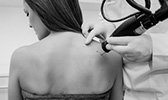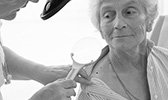Experienced dermatologists in Alexandria provide skin cancer prevention guidelines
Skin cancer is so prevalent that about 20 percent of our population will experience it at least once by the age of 70. The team at Braun Dermatology encourages everyone in the Alexandria area to learn more about this serious health condition. Our doctors share the following skin cancer prevention guidelines. Please use this advice to protect your own skin, and feel free to share the information with others.
Q: How do I know if I have skin cancer?
A: Skin cancer can have many varied appearances and can even appear to be normal skin. As with all cancers, though, skin cancer will grow and typically becomes bigger and more noticeable with time. Unfortunately, many patient’s skin cancer goes undiagnosed for numerous reasons:
- some people are not paying attention to their skin and do not recognize that they have a new lesion
- some lesions are located on skin that is difficult to see such as the scalp and back
- some patients notice the lesion, but do not seek care by a dermatologist due to fear or inconvenience. If you notice a new or changing lesion on your skin, please see a dermatologist.
Non-melanoma skin cancer, such as squamous cell carcinoma and basal cell carcinoma are most typically pink, but can be skin colored or even brown. They can often bleed easily and initially are often mistake for a pimple that does not resolve. There are so many different appearances of non-melanoma skin cancer, that it is important to have any new or growing skin lesions evaluated by a dermatologist.
Recognizing melanoma can also be challenging. Guidelines for recognizing melanoma have been described below:
A – Asymmetrical shape. If you drew a straight line through the spot, would the halves look the same?
B – Border irregularities. Is the outline of the spot scalloped or jagged?
C –Color. Non-cancerous moles can range in color from flesh-toned to dark brown. However, watch for bluish or purplish shading, or a spot that contains multiple colors.
D –Diameter. Benign moles are generally smaller across than a pencil.
E – Evolving in color, shape, size, elevation, or texture, or a “mole” that begins to itch, hurt, seep, or bleed.
Some cancers grow quickly, so it is important to see a dermatologist right away if you have a spot that exhibits any of the A, B, C, D, E or is new on your skin.
Q: Is skin cancer a valid concern in the Alexandria, VA area?
A: Skin cancer is a genuine concern everywhere. Anyone – both genders, all ethnicities, and any age – can develop skin cancer.
The overwhelming risk factor for skin cancer is exposure to ultraviolet light from the sun or tanning devices. This includes just one or a few severe sun burns (especially during childhood), as well as damage that accumulates over time – even on cloudy or winter days.
Residents of the Alexandria, VA area enjoy an average of 201 sunny days each year. There are dozens of golf courses, the beach is just a few hours away, and skiing is popular in wintertime. You do not have to live in Southern California or Florida to be at risk for skin cancer. There are plenty of opportunities right here.
Q: What skin cancer guidelines should be followed in Alexandria?

A:
- Minimize exposure to the sun between 10:00 a.m. and 4:00 p.m. Schedule your daily walk or tennis game first thing in the morning or plan a sightseeing trip in the evening.
- Use broad spectrum, high SPF sunscreen every day. Apply it in the morning, at least 30 minutes before going out. Use about an ounce to cover the entire body. Reapply after perspiring, swimming, or showering – even if you use a waterproof variety.
- Clothing provides even better protection. Wear long sleeves and slacks if you must be in the sun during peak hours.
- Scalp, ears, back of neck, and nose are susceptible to sun damage. Wear a broad-brimmed hat to safeguard these delicate areas.
- Eyes have melanin-producing cells, so sun exposure can cause ocular melanoma. When outdoors during the day, wear sunglasses with good UV protection.
- Do not tan, in the sun or in a tanning bed. If you like the look, consider a spray tan for special occasions.
- Schedule a full body skin cancer screening with a Board-certified dermatologist..
- Check your own skin head to toes, front and back, once a month. If you find a suspicious spot or discover a new one, have it evaluated by your dermatologist right away. The prognosis for most skin cancers is very good with early detection, accurate diagnosis, and effective treatment.
Call 571-449-2555 to schedule your skin cancer screening at Braun Dermatology in Alexandria, VA, or 202-816-7557 for our Washington, DC office.
Share this Article

Braun Dermatology & Skin Cancer Center
Braun Dermatology is home to a team of highly qualified, experienced providers, including board-certified dermatologists, physician assistants, and master estheticians. Every team member relies on advanced training and expertise to provide optimal care. Patients in and around Washington, DC, and Alexandria, VA, trust Braun Dermatology and Skin Cancer Center for their reliable, evidence-based approach to dermatology.



 Medical
Medical Cosmetic
Cosmetic Mohs
Mohs CoolSculpting
CoolSculpting Lasers and
Lasers and miraDRY
miraDRY